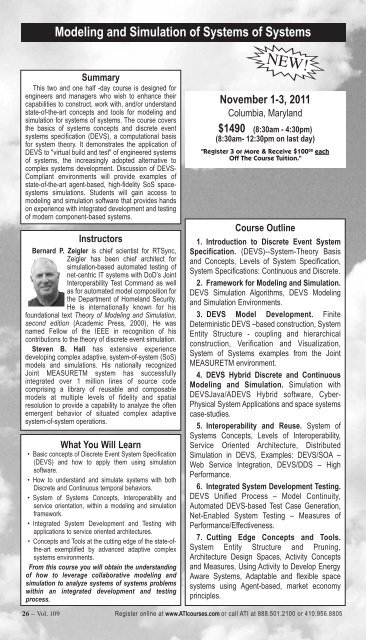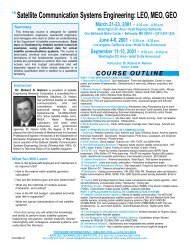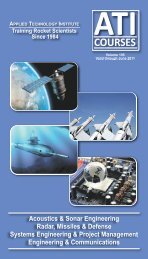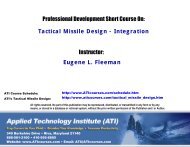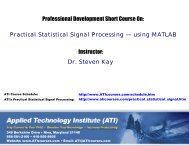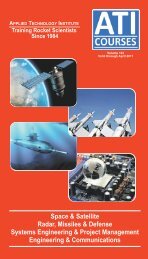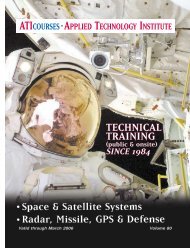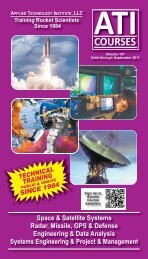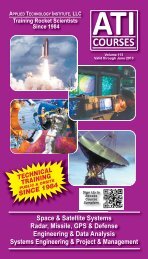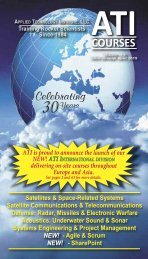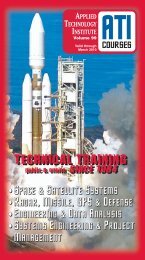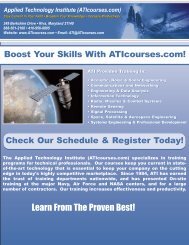Acoustics & Sonar Engineering Radar, Missiles & Defense Systems ...
Acoustics & Sonar Engineering Radar, Missiles & Defense Systems ...
Acoustics & Sonar Engineering Radar, Missiles & Defense Systems ...
You also want an ePaper? Increase the reach of your titles
YUMPU automatically turns print PDFs into web optimized ePapers that Google loves.
Modeling and Simulation of <strong>Systems</strong> of <strong>Systems</strong><br />
Summary<br />
This two and one half -day course is designed for<br />
engineers and managers who wish to enhance their<br />
capabilities to construct, work with, and/or understand<br />
state-of-the-art concepts and tools for modeling and<br />
simulation for systems of systems. The course covers<br />
the basics of systems concepts and discrete event<br />
systems specification (DEVS), a computational basis<br />
for system theory. It demonstrates the application of<br />
DEVS to "virtual build and test" of engineered systems<br />
of systems, the increasingly adopted alternative to<br />
complex systems development. Discussion of DEVS-<br />
Compliant environments will provide examples of<br />
state-of-the-art agent-based, high-fidelity SoS spacesystems<br />
simulations. Students will gain access to<br />
modeling and simulation software that provides hands<br />
on experience with integrated development and testing<br />
of modern component-based systems.<br />
Instructors<br />
Bernard P. Zeigler is chief scientist for RTSync,<br />
Zeigler has been chief architect for<br />
simulation-based automated testing of<br />
net-centric IT systems with DoD’s Joint<br />
Interoperability Test Command as well<br />
as for automated model composition for<br />
the Department of Homeland Security.<br />
He is internationally known for his<br />
foundational text Theory of Modeling and Simulation,<br />
second edition (Academic Press, 2000), He was<br />
named Fellow of the IEEE in recognition of his<br />
contributions to the theory of discrete event simulation.<br />
Steven B. Hall has extensive experience<br />
developing complex adaptive, system-of-system (SoS)<br />
models and simulations. His nationally recognized<br />
Joint MEASURETM system has successfully<br />
integrated over 1 million lines of source code<br />
comprising a library of reusable and composable<br />
models at multiple levels of fidelity and spatial<br />
resolution to provide a capability to analyze the often<br />
emergent behavior of situated complex adaptive<br />
system-of-system operations.<br />
What You Will Learn<br />
• Basic concepts of Discrete Event System Specification<br />
(DEVS) and how to apply them using simulation<br />
software.<br />
• How to understand and simulate systems with both<br />
Discrete and Continuous temporal behaviors.<br />
• System of <strong>Systems</strong> Concepts, Interoperability and<br />
service orientation, within a modeling and simulation<br />
framework.<br />
• Integrated System Development and Testing with<br />
applications to service oriented architectures.<br />
• Concepts and Tools at the cutting edge of the state-ofthe-art<br />
exemplified by advanced adaptive complex<br />
systems environments.<br />
From this course you will obtain the understanding<br />
of how to leverage collaborative modeling and<br />
simulation to analyze systems of systems problems<br />
within an integrated development and testing<br />
process.<br />
NEW!<br />
November 1-3, 2011<br />
Columbia, Maryland<br />
$1490 (8:30am - 4:30pm)<br />
(8:30am- 12:30pm on last day)<br />
"Register 3 or More & Receive $100 00 each<br />
Off The Course Tuition."<br />
Course Outline<br />
1. Introduction to Discrete Event System<br />
Specification. (DEVS)--System-Theory Basis<br />
and Concepts, Levels of System Specification,<br />
System Specifications: Continuous and Discrete.<br />
2. Framework for Modeling and Simulation.<br />
DEVS Simulation Algorithms, DEVS Modeling<br />
and Simulation Environments.<br />
3. DEVS Model Development. Finite<br />
Deterministic DEVS –based construction, System<br />
Entity Structure - coupling and hierarchical<br />
construction, Verification and Visualization,<br />
System of <strong>Systems</strong> examples from the Joint<br />
MEASURETM environment.<br />
4. DEVS Hybrid Discrete and Continuous<br />
Modeling and Simulation. Simulation with<br />
DEVSJava/ADEVS Hybrid software, Cyber-<br />
Physical System Applications and space systems<br />
case-studies.<br />
5. Interoperability and Reuse. System of<br />
<strong>Systems</strong> Concepts, Levels of Interoperability,<br />
Service Oriented Architecture, Distributed<br />
Simulation in DEVS, Examples: DEVS/SOA –<br />
Web Service Integration, DEVS/DDS – High<br />
Performance.<br />
6. Integrated System Development Testing.<br />
DEVS Unified Process – Model Continuity,<br />
Automated DEVS-based Test Case Generation,<br />
Net-Enabled System Testing – Measures of<br />
Performance/Effectiveness.<br />
7. Cutting Edge Concepts and Tools.<br />
System Entity Structure and Pruning,<br />
Architecture Design Spaces, Activity Concepts<br />
and Measures, Using Activity to Develop Energy<br />
Aware <strong>Systems</strong>, Adaptable and flexible space<br />
systems using Agent-based, market economy<br />
principles.<br />
26 – Vol. 109 Register online at www.ATIcourses.com or call ATI at 888.501.2100 or 410.956.8805


